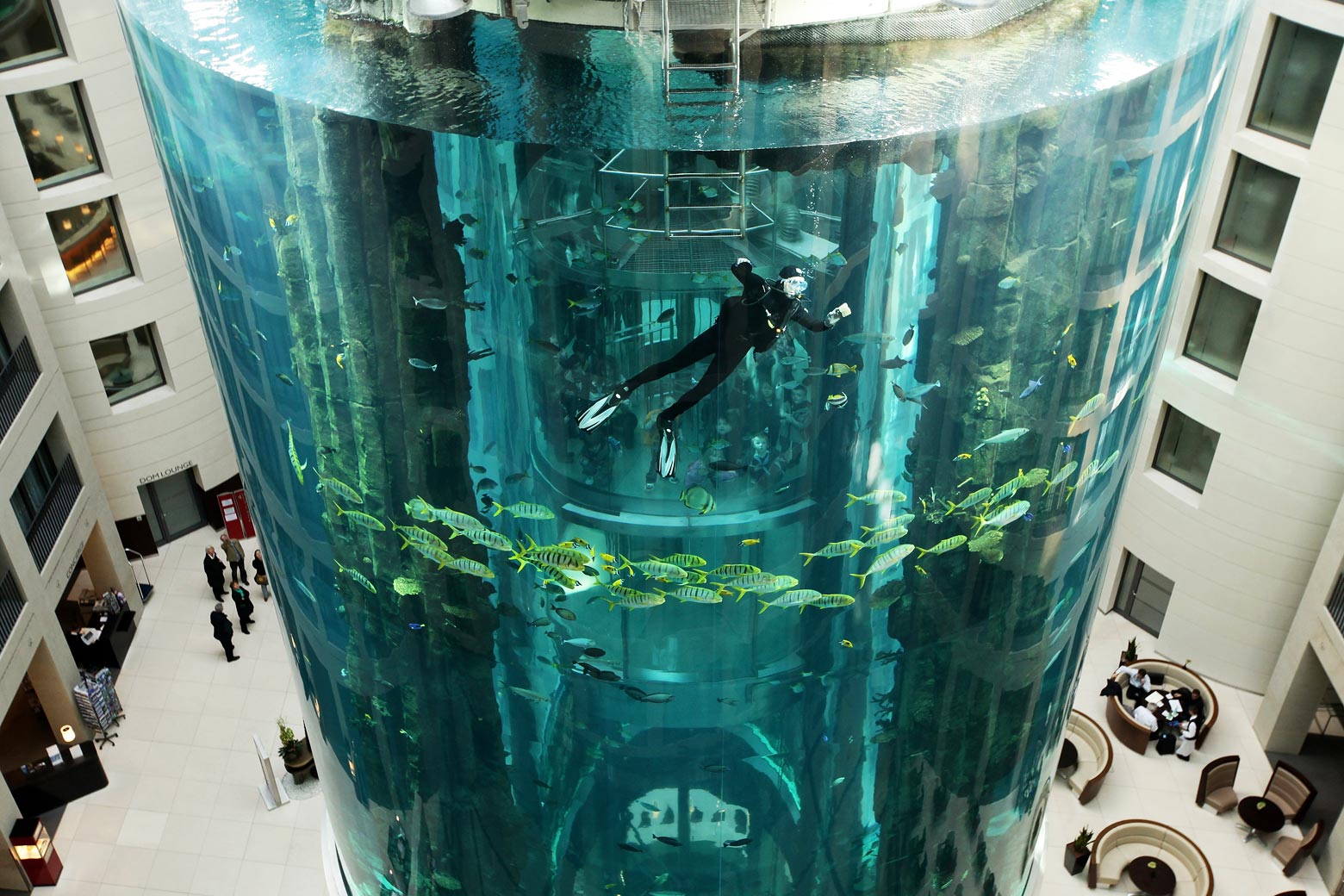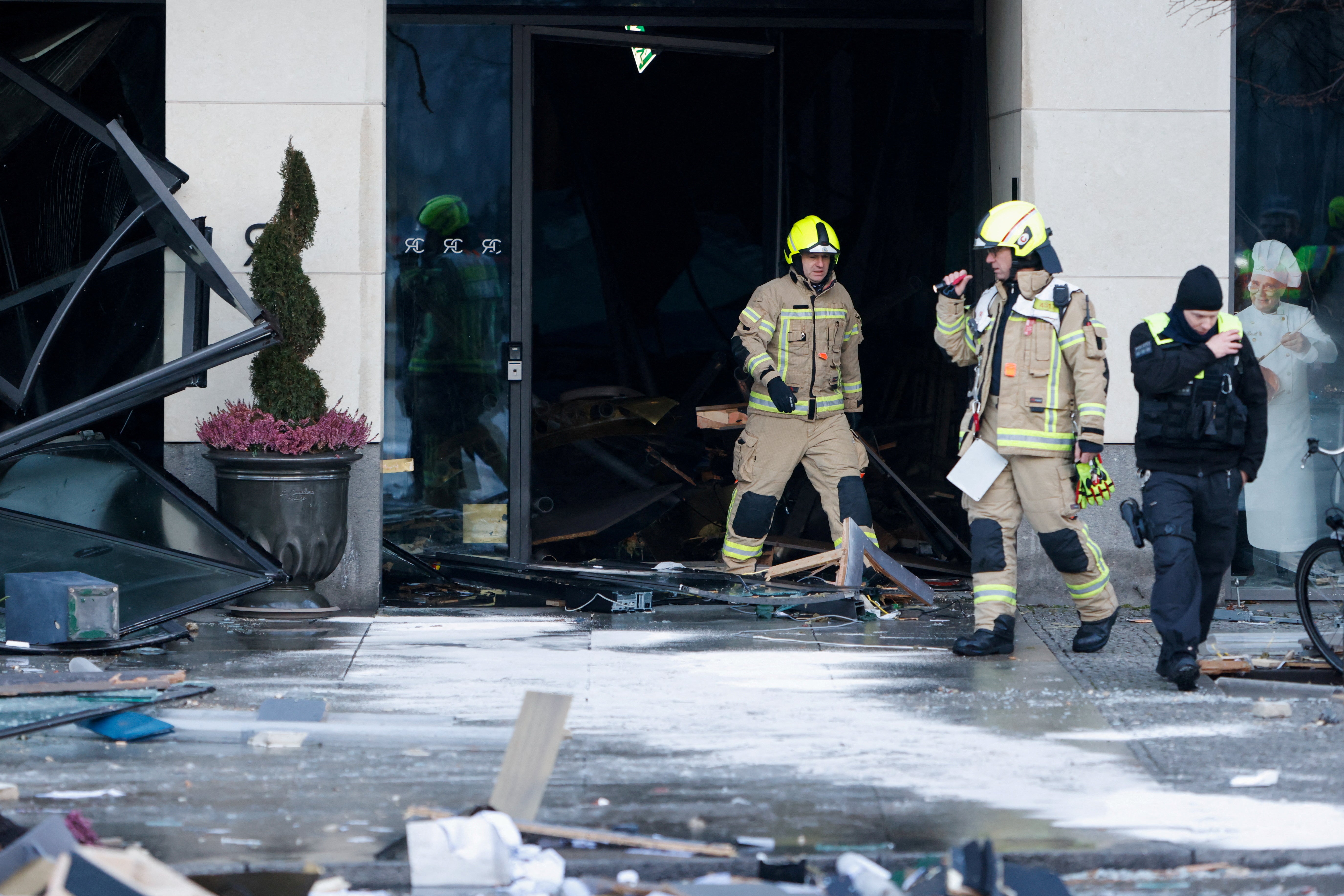Firefighters had already cleared the dead fish from the frigid street by the time I showed up, on Friday morning, outside the smashed front doors of Berlin’s five-star Radisson hotel.
Just hours before, the hotel’s massive AquaDom—billed as the largest freestanding cylindrical aquarium tank in the world—had exploded suddenly, causing a surge of more than a quarter-million gallons of saltwater, along with roughly 1,500 fish, to course through the hotel’s lobby and onto street.
Much of the immediate area—a bustling, tourist-packed hub of broad Communist-era boulevards, shadowed by the red-brick spire of Berlin City Hall—was temporarily closed-off. Bemused tourists and locals gawked from the sidewalk.
Berlin Mayor Franziska Giffey, who described the aquarium’s sudden bursting as “a downright tsunami,” initially declared that none of the marine life survived the disaster.

Photo by Sean Gallup/Getty Images)
But that turned out to be not completely true: Firefighters discovered a handful of survivors flopping helplessly in puddles among the debris of the elevator and in the lower support ring of the massive aquarium, which had, when not exploded, measured roughly 55 feet high and 38 feet wide. Survivors were hauled to safety in plastic tubs. Hundreds more fish were rescued from separate tanks elsewhere in the complex and sent to the Berlin zoo, private fish breeders, and a nearby aquarium for safe-keeping.
Still, the aquatic carnage was extensive—and the reaction, from the press and citizens alike, was one of shock, coupled with a dose of lamentation and self-recrimination. “The WATER BOOM” screamed the cover of BZ, the city’s leading tabloid, under a photo of mangled remains in the ruined lobby. (Many local newspapers led with photos of a giant dead fish.) The local evening news showed footage of pigeons pecking at chunks on the street.
That the explosion happened in Berlin, often cast as the dysfunctional and mismanaged stepchild to a nation otherwise known for quality engineering, struck many as fitting. Several online pundits were quick to draw parallels between the spectacular aquarium failure and the city’s sparkling embarrassment of a new international airport, which ran billions of dollars over budget, opened a decade late and remains largely a nightmare for travelers.
Der Spiegel ran a column describing the explosion of the aquarium as “the perfect symbol for 2022” and a potent metaphor for the last year in German public life. Germany had, in recent years, appeared to be a marvel of stability, until a crack appeared—created by Russia’s invasion of Ukraine—and, all at once, everything gave way.
“The whole structure, apparently so meticulously constructed, collapsed,” Tobias Rapp, an editor at the magazine, wrote about both the giant hotel aquarium and the social fabric of the nation. “Energy shortages, inflation, geopolitical danger: all the scourges from which Germans falsely believed they were safe had suddenly returned.”
How, you may ask, could this isolated fish fiasco become a metaphor for German failure (at least for some pundits)?
It has been an unsettling year. The country that seemed to coast through crisis after crisis apparently unscathed during the Merkel years has finally faced some major reckonings: a winter without cheap Russian gas, an economy sputtering amid inflation, a major war on the E.U.’s border.
Oh, and the powerhouse German national soccer team sent packing early—again!—at the World Cup.
So something about those poor fish being thrown from their tropical pool seemed of-a-piece with it all. Sandra Weeser, a German member of parliament who happened to be staying in the hotel at the time, told a local newspaper reporter that she awoke to the shockwave of the explosion and the building shaking but fell back asleep thinking it must’ve been a dream. After she woke again an hour later, she passed a large parrot fish—already frozen—on her way out.
The chilly weather, which killed the tropical fish almost instantly, didn’t help. Temperatures overnight had tumbled down to about 15 degrees Fahrenheit, the coldest of the season so far in Berlin (and some 60 degrees colder than the heated saltwater of the tank).
The aquarium, located just across the Spree River from the Berlin Cathedral in the heart of the city, was a genuine attraction for the German capital. A bar ringed the base of the aquarium in the hotel’s lobby, making it a popular and rather spectacular spot to sip a cocktail in a particularly kitschy and touristy part of town. Visitors could pay to take a slow ride on a glass elevator directly through the center of the tank.
In many ways, the timing of the explosion probably limited the scope of the tragedy. Two people—a guest and a hotel employee—were wounded by flying glass. Giffey, the mayor, said the city was lucky the aquarium burst so early in the morning while guests were asleep, the lobby largely vacant and nearby shops still shuttered.

Reuters
Even hours later, a fire department spokesman told me that the debris from the explosion was too thick for firefighters to work through the wreckage in the lobby. Instead, search and rescue dogs from the Red Cross were brought in to make sure no one was trapped inside.
By Monday morning, the immediate cleanup was mostly complete, although the building itself remained an off-limits disaster zone surrounded by construction fencing. Shops in the building, including a Lindt chocolate outlet and a gift shop peddling tchotchkes festooned with Berlin’s iconic Ampelmännchen traffic-light figures, remained indefinitely closed. Shuttered, too, was the DDR Museum located beneath the hotel, devoted to depicting daily life in the defunct communist German Democratic Republic.
Will the great AquaDom be rebuilt? Unclear. A spokesman for the property owner, Union Investment, told local media that they’re still assessing what to do with the space once the clean-up is over.
Some voices in Berlin are already calling for its return. Ephraim Gothe, a Berlin city councilman who represents the area, told the Berliner Morgenpost that the AquaDom was an attraction of worldwide renown and importance. Unsurprisingly, PETA had already come out swinging against rebuilding it. The organization has threatened legal action and called for a monument to be erected in memory of the dead fish.
But could it ever be the same? A central part of the novelty and attraction of sitting beneath the aquarium was staring in slack-jawed wonder that the entire monstrosity didn’t explode, that the plexiglass walls managed to hold against the weight and pressure of all that water – and wondering just what might happened if even the smallest crack appeared and began to grow.
Back then, back before the entire thing suddenly erupted in a spectacular mess, you could take another sip of your drink and assure yourself that a whole team of eminently qualified experts had created this marvel of modern engineering. And that engineering was German.